Kitchens have become a home hub in the modern age. A bustling space for family catch-ups, recipe explorations, and happy gatherings – the kitchen is a gathering place that brings people closer together. It has become a space where ideas are shared, dishes are transformed and memories are created. It’s more than a room of appliances and gadgets; it’s a sanctuary within the home.
Due to the reason that contemporary kitchens are also used for socializing and entertaining, kitchen design is crucial. A kitchen with a thoughtful layout makes cooking and tidying more enjoyable and efficient. It takes into account ergonomics and makes essential appliances and equipment accessible.
Additionally, kitchen design establishes the tone for the entire house. Modern materials, colors, and finishes can create a visually appealing atmosphere that reflects the homeowner’s taste and enhances the home’s mood.
This article will discuss the top twelve kitchen design trends altering our perceptions of this essential home component. These trends can help you remodel your kitchen or if you’re simply a fan of interior design.
How Kitchen Design Trends Evolve Over Time
When it comes to home design trends, kitchens take center stage as homeowners look to incorporate the latest trends into their spaces. Combining style with functionality, these modern kitchen designs bring together a unique blend of materials and finishes to create functional areas that also look stylish. Whether they opt for a traditional look or something contemporary, this space offers endless potential for homeowners to make their vision a reality.
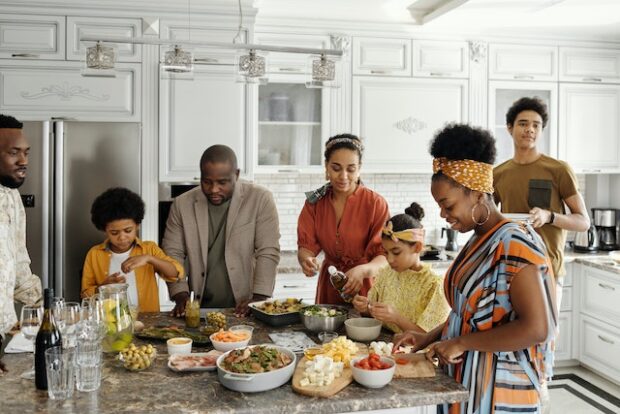
Culture, technology, and people’s ever-evolving preferences all impact the latest kitchen design trends. As the importance of cooking and hosting social gatherings has grown, kitchens have evolved from being merely practical rooms to becoming the heart of the home.
The growing popularity of open floor plans, driven by designing your own home, is breaking down walls to make it easier to travel from the kitchen to the rest of the house, creating a more open and inviting space. Kitchen islands and breakfast bars, also influenced by designing your own home, have become increasingly common, serving multiple purposes such as food preparation, eating, and socializing.
The 13 Most Popular Kitchen Designs for Modern Homes
1. Minimalistic Sleek Design
Modern residences favor minimalist kitchens. Straight lines, simplicity, and a lack of excess create a streamlined appearance. Stainless steel, natural wood, and glass complement neutral colors such as whites, grays, and earth tones. Concealed cabinets and appliances contribute to a minimalist aesthetic. This trend emphasizes functionality, efficiency, and quietness for a contemporary, clutter-free kitchen.
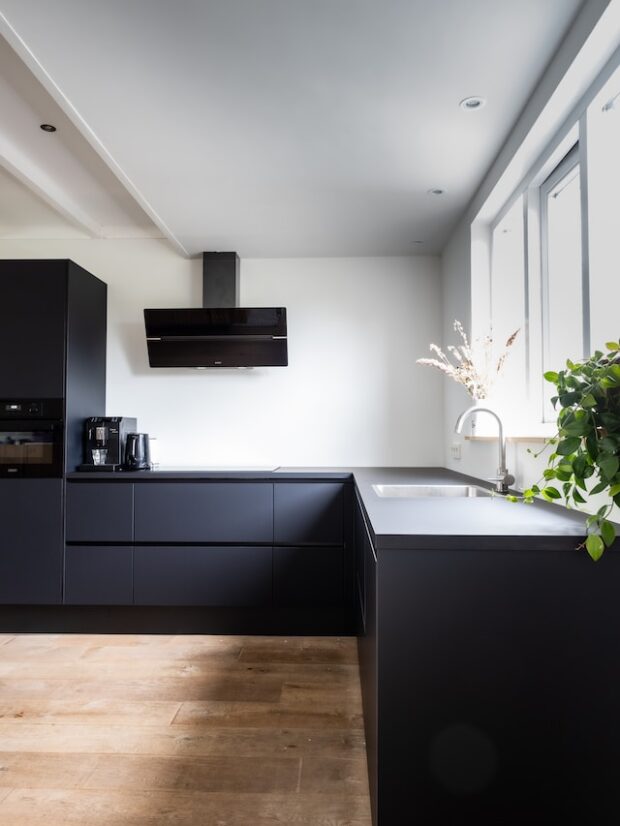
2. Open Concept Layouts
Open kitchen layouts have altered contemporary home design. This concept involves opening the kitchen to the dining and living areas to create a sense of space and fluidity. Kitchen islands and breakfast bars provide additional seating and workspace. Open floor plans, influenced by designing your own home, enable hosts to interact with visitors while cooking. This trend in interior design, inspired by designing your own home, maximizes natural light, promotes family unity, and creates a flexible space for daily activities.
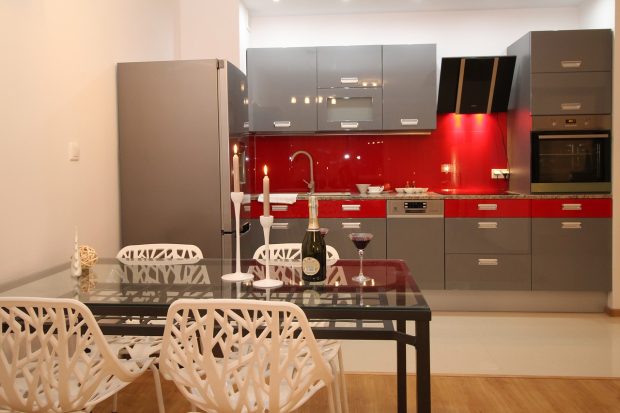
3. Sustainable Living
The top modern kitchen design integrates eco-friendly and sustainable elements, reflecting an increasing awareness of the environmental impact and a desire to live sustainably. This trend emphasizes energy-efficient lighting and equipment. Reclaimed wood, bamboo, recycled glass countertops, and environmentally friendly cabinetry reduce the kitchen’s carbon footprint.
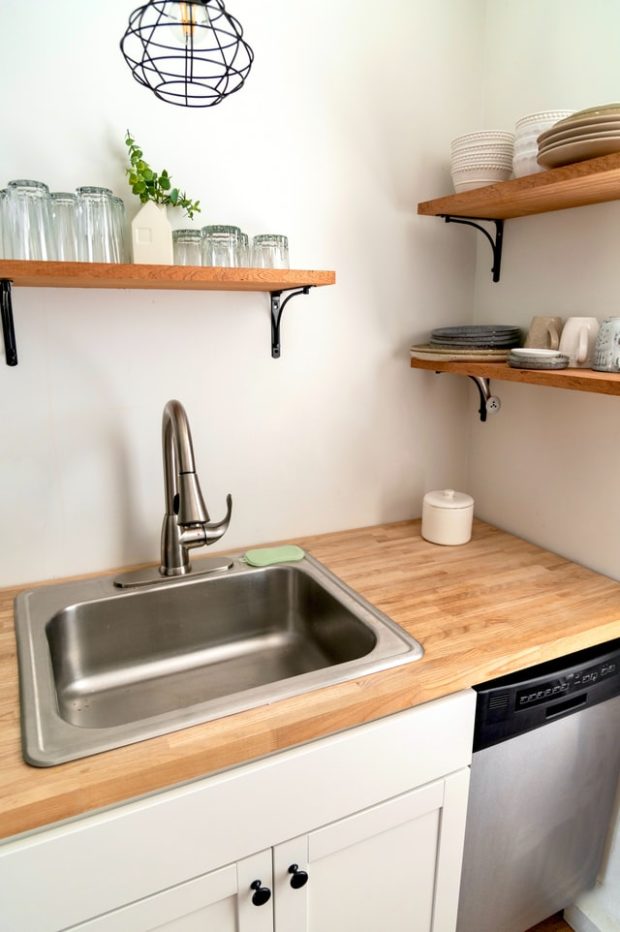
Composting systems and recycling bins promote refuse management while water-saving fixtures and faucets promote water conservation. Using sustainable and eco-friendly materials, contemporary kitchens produce healthier, greener dwellings.
4. Eco-Friendly Elements
As householders become more environmentally conscious, designing their own homes with eco-friendly elements is emphasized in modern kitchen design. Energy-efficient kitchen appliances reduce electricity consumption and environmental impact. Recycled glass countertops, bamboo flooring, and reclaimed wood cabinetry encourage a circular economy by reducing reliance on virgin resources. Recycling and composting systems facilitate refuse management, whereas water-saving fixtures and faucets conserve water. Using eco-friendly materials, homeowners can design a kitchen that is aesthetically pleasing and beneficial to the environment.
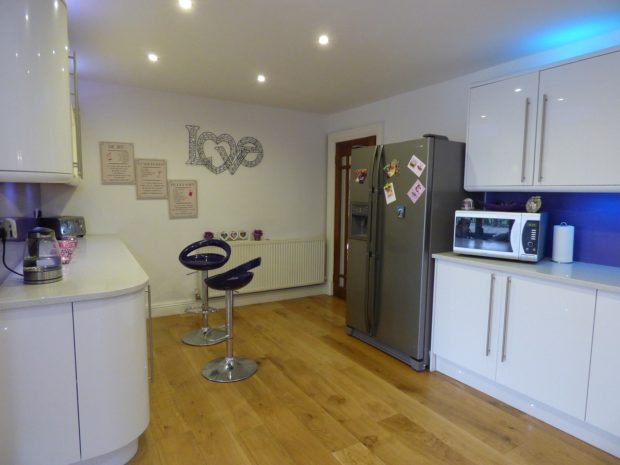
5. Technology and Smart Kitchen Features
Technology and intelligent culinary features have revolutionized kitchen use. This trend incorporates smart appliances and contemporary technology to enhance the kitchen’s convenience, efficiency, and connectivity. There are remote controls, automated culinary programs, and energy monitoring on refrigerators, ovens, and dishwashers.
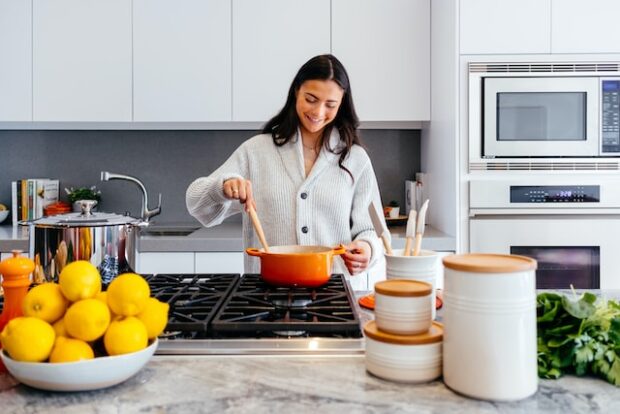
Amazon Alexa and Google Assistant can be integrated into the kitchen to control appliances and provide useful information such as recipes, timers, etc. Connected culinary systems offer synchronized cooking and customizability. Technology and intelligent kitchen features can facilitate cooking, reduce energy consumption, and enhance kitchen connectivity.
6. Statement Lighting
Lighting fixtures of note illuminate modern kitchens. As focal points of the kitchen, these fixtures add elegance and opulence. Pendant lights and chandeliers make a bold lighting statement with intricate patterns, unique shapes, and luxurious materials. They illuminate and enhance aesthetic appeal. Mixing tasks, ambient, and accent illumination permits customization in the kitchen. Kitchen lighting fixtures that make a statement can elevate its design, leave an enduring impression, and transform it into a home showpiece.
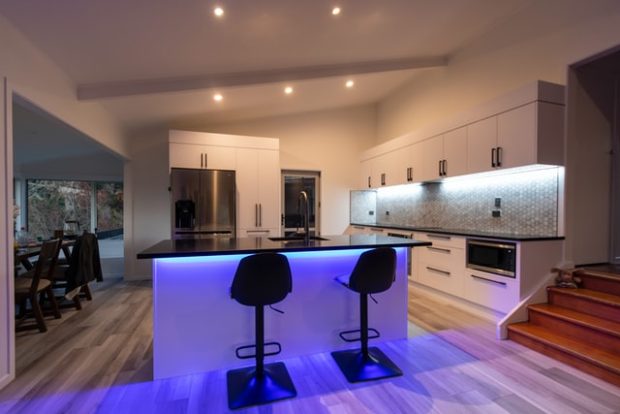
7. Use of Natural and Organic Materials
Natural and organic materials provide top modern kitchen designs with coziness, authenticity, and sustainability. This trend highlights elegant and resilient natural stone surfaces like granite and marble. Cabinetry, flooring, and ceiling beams made of wood provide natural elegance and texture. Living plants and herbs give the kitchen vitality and beauty. Using natural and organic materials, homeowners can create a harmonious and pleasurable kitchen that expresses their appreciation for nature.
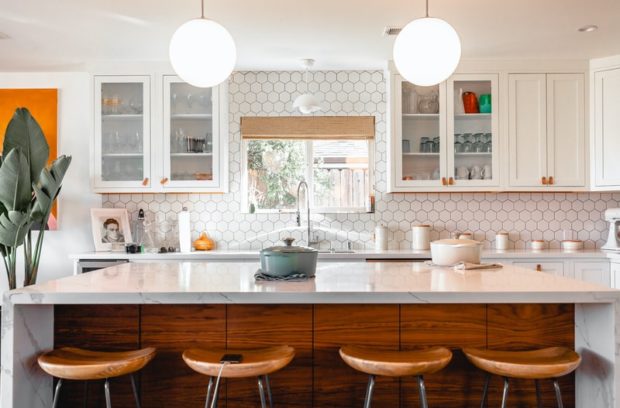
8. Multifunctional Workspaces
Modern kitchen design prioritizes multifunctional workspaces in the interest of efficiency and adaptability. These workstations for meal preparation, cooking, and washing are compact and well-organized. Islands and counters provide space for food preparation, seating, and storage. Integrated sinks, cutting boards, and pull-out shelving enhance efficiency. Multifunctional kitchen workspaces maximize efficiency, adaptability, and space.
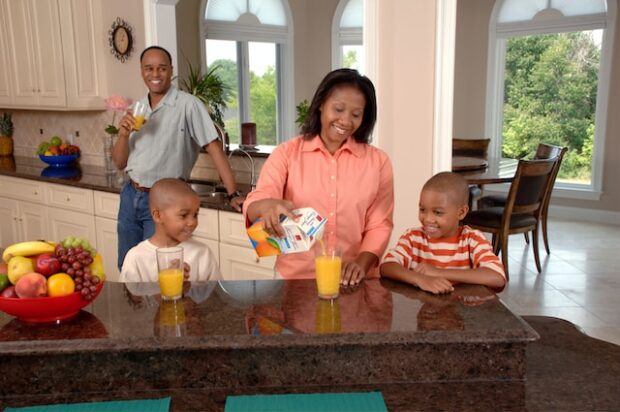
9. Smart Storage Solutions
Smart storage solutions, a key aspect of top modern kitchen design, revolutionizes the design of latest kitchens by organizing and optimizing storage space. These techniques maximize space to organize and declutter a kitchen of any size. Cookware, dishes, and pantry items are stored in tall cabinets and shelving. Pull-out drawers make utensils, spices, pots, and pans readily accessible and organized.
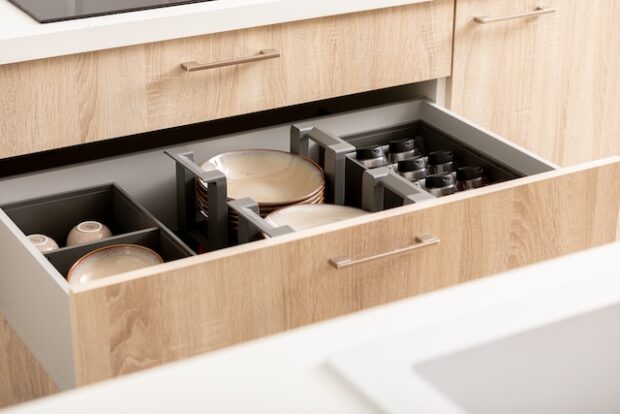
Hide unsightly clutter with overhanging cabinets and toe-kick drawers that neatly store away items. Create a neat, tidy look with these space-saving solutions. Smart storage solutions can optimize the functionality of a kitchen, keep everything within easy reach, and provide a well-organized environment for swift meal preparation and enjoyable cooking.
10. Mixed Metal Finishes
Modern kitchens benefit from mixed metal finishes because they add dimension and visual appeal. Stainless steel, brass, copper, and oxidized iron are all used in this concept to create a one-of-a-kind look. Combining hot and cold metals produces harmony. For example, brass or copper hardware and stainless steel appliances contrast beautifully. Matte and brushed finishes add character and dimension to the kitchen. Mixed metal finishes enable householders to create a contemporary, eclectic space that reflects their personal style and adds sophistication to the kitchen design.
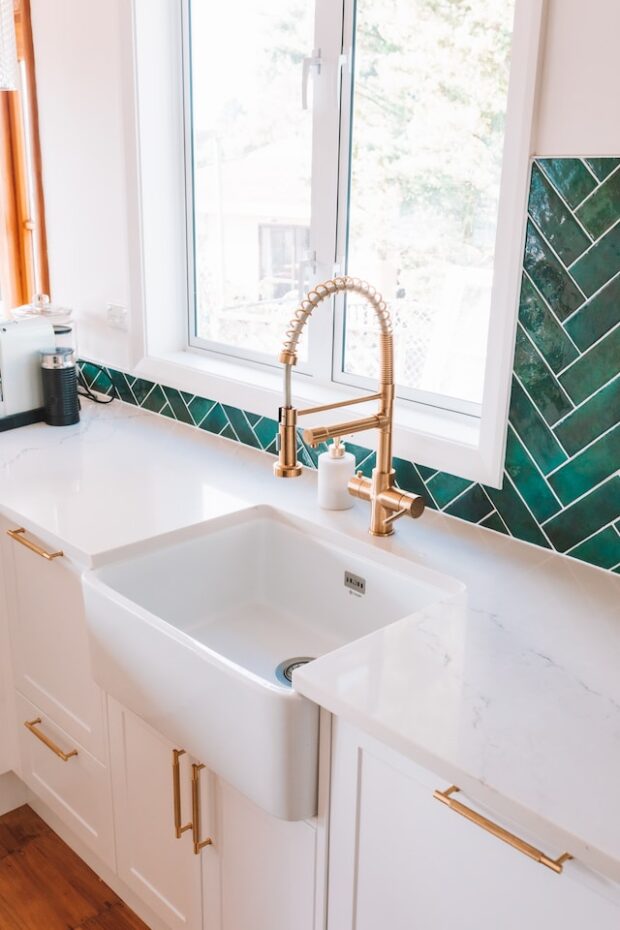
11. Texture and Layering
Texture and layering add dimension, aesthetic appeal, and richness to contemporary kitchens. This strategy creates a tactile and dynamic environment by layering textures and materials. Combining smooth, glossy surfaces with natural stone, masonry, or reclaimed wood creates an arresting contrast.
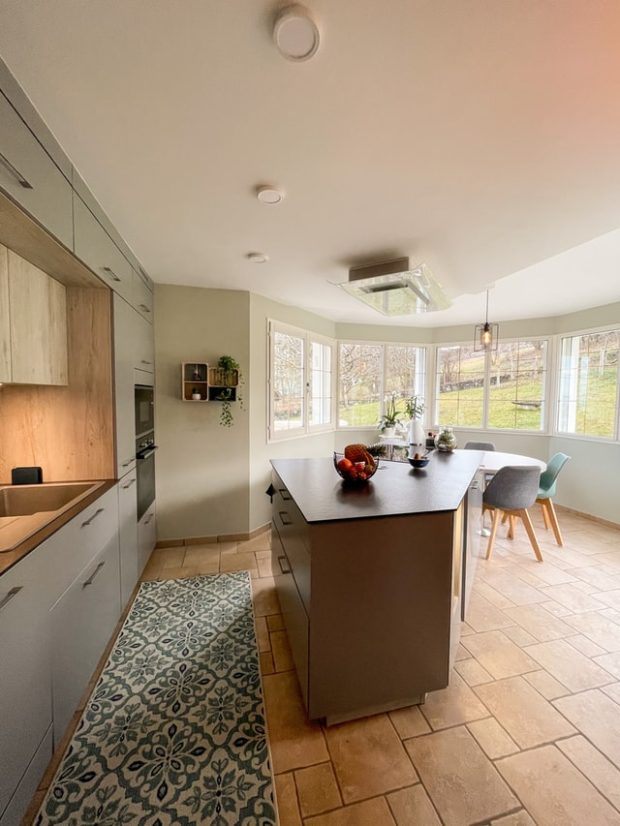
Countertops, backsplashes, and cabinets made of distinct materials create stratification. Rugs, drapes, and upholstered chairs give the kitchen texture and intimacy. By incorporating texture and layering in their kitchen, homeowners can achieve a top modern kitchen design that is visually captivating and invitingly cozy.
12. Ergonomic and User-Friendly Designs
Modern kitchen design places a premium on ergonomics, functionality, and accessibility. This trend improves the physical connection and workflow in the kitchen. The placement of appliances, workstations, and storage minimizes movement and facilitates access to essential items.
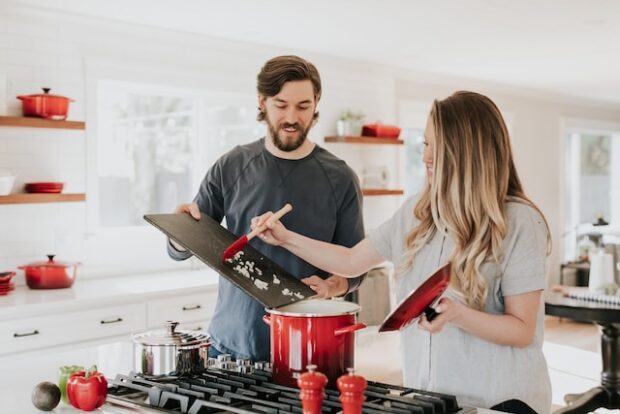
Ergonomic features include adjustable countertop heights, comfortable seating, and easily accessible stowage. User-friendly features include soft-closing cabinets, touchless faucets, and smart appliances with simple controls. By emphasizing ergonomic and user-friendly designs, homeowners can construct stylish kitchens that are simple to clean, cook in, and appreciate.
13. Outdoor Integration
Frequently, modern kitchens combine interior and outdoor spaces. This style readily extends kitchen design to outdoor areas such as patios, decks, and gardens, creating a cohesive and functional entertaining space. Outdoor kitchens equipped with grills, pizza ovens, and sinks enable outdoor cooking and dining, while comfortable seating areas create a casual atmosphere for mingling and dining.
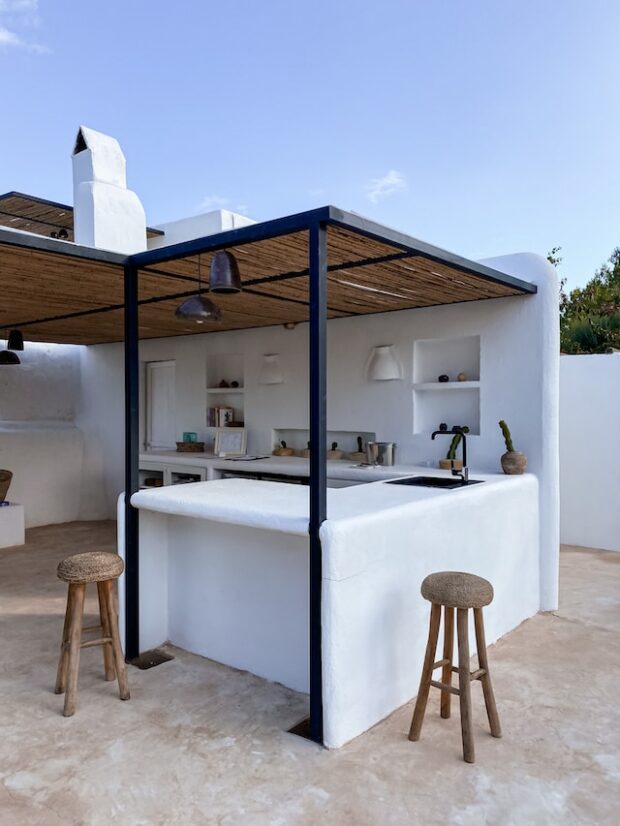
The kitchen is impervious due to its natural stone countertops, weatherproof cabinetry, and solid flooring. Incorporating the outdoors expands living space, enhances culinary experiences, and creates an adaptable and inviting environment for indoor and outdoor activities.
Conclusion
Contemporary kitchens surpass aesthetics and functionality. It reflects the homeowner’s lifestyle, values, and desire for convenience and communication. A gorgeous and functional kitchen inspires cooking, hosting, and socializing.
Modern families gather in the kitchen to share meals, stories, and recollections. The design of the kitchen sets the tone for these special occasions. A well-designed kitchen encourages interaction and camaraderie through its materials, illumination, and seating.
A well-constructed kitchen can increase the value, enjoyment, and unity of a home. Through careful planning, kitchen design provides functional utility, expresses distinct personality and style, and fosters meaningful connections. Sophisticated kitchen design is the cornerstone to creating a space that not only satisfies practical demands but also enriches the lives of those who inhabit it.
The post Kitchen Design Trends for Modern Homes: What You Need to Know? appeared first on YourAmazingPlaces.com.
from YourAmazingPlaces.com https://ift.tt/4igRFJ7








0 comments:
Post a Comment